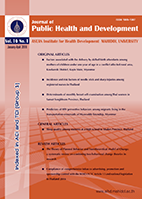Compliance of comprehensive tobacco advertising, promotion and sponsorship control with the WHO-FCTC Article 13 and national legislation in Thailand 2016
Main Article Content
Abstract
This study aimed to assess Thailand’s compliance with WHO Framework Convention on Tobacco Control (FCTC) on Tobacco advertising, promotion and sponsorship (TAPS). Using an assessment standardized tool following FCTC Implementation Guidelines and the 2014 FCTC Global implementation progress report, four scores ranging from 0-4 (0=no implementation-4=full implementation) were given to assess each topic on Thailand tobacco control. Composite scores were computed based on indicators of FCTC implementation and compliance reported in each topic. Secondary data was computed from a focused-group discussion consisting of partner sectors and stakeholders in tobacco control. Two assessment discussions were held in 2016 in Bangkok where experts, researchers and partner sectors used the assessment tool to review 18 items under 4 main recommendations on TAPS ban with TAPS report in Thailand as input for discussion. Findings were assessed for compliance with the FCTC Article 13 framework.
Thailand partially met the FCTC Article 13 recommendations on advertising and promotion tobacco control and has a complete ban on mass media advertising, promotion and POS display in fixed retail outlets. Thailand has put health warning messages as mandatory and prohibited descriptive labels. However, gaps still remained, the tobacco industry switched to indirect advertisement in some less explicit media and online/social media. Average score of Article 13 implementation in Thailand was 0.7 (out of 3.0) as scored by stakeholders which meant Thailand has compliance with FCTC Article13 but not adequate in some areas.
This study suggested that the recent passage of Thailand Tobacco Control Act (2017) will be a key in enforcing advertising, promotion and sponsorship ban in all media including online media. Partnership working with law enforcer, media agencies and ICT agencies in responding to newer forms of indirect/online advertising and promotional activities are recommended.


